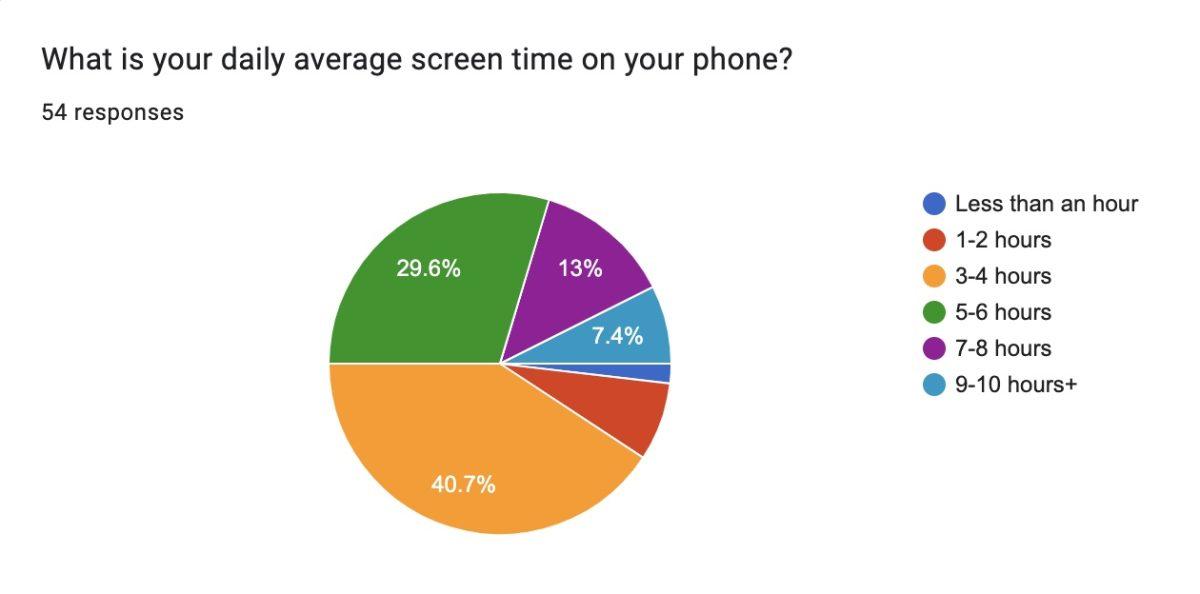Ever since the first iPhone came out in 2007, they have rapidly grown in popularity and use. With the convenience of fast communication, smartphones became unmatched. On top of that, when social media platforms like Instagram and TikTok came into the picture, phones became more than just a tool. Now these apps, which can seem harmless on paper, can also be extremely detrimental to one’s attention span and overall mental health. As phones have become such a large part of most students’ lives, it can be important to learn how to cope and deal with these devices in a healthy way.
Anyone who has been on any social media platforms may relate to how easy it is to waste hours at a time without even knowing it. From my own experiences, it’s one of the worst feelings when you sit down on your phone one second, then look up the next and it’s dark out. These apps make phones a huge time suck for everyone, but now imagine having something that is that addictive in a classroom, in students’ pockets. It’s no wonder that so many students struggle with being on their phone in class.
Many teachers deal with phone usage by telling students to keep their phones in their backpacks or to put them in a calculator slot at the front of the class. This can sometimes work, but a lot of the time students are still going on their phones in class.
Students continuing to sneak time on phones, even when teachers attempt to set rules to limit their usage, shows how students have to want to be off their phones in order to break this habit. With no interest in cutting down on your screen time, there isn’t any motivation to push you to fix it in the first place. Making the decision to reduce screen time is already a big step towards breaking phone habits.
In a survey that received 53 responses from students here at Franklin, about 40% of the students answered that the average daily time they spent on their phone ranged from three to four hours. Along with that, 29% answered that on average they spend five to six hours on their phones a day. According to multiple health websites such as Reid Health and My Kids Vision, the recommended amount of screen time a teen should be getting is two hours per day. That is obviously way less time than the average student who took this survey is spending on their phone.
The survey also sheds light on how students want to reduce their screen time. The majority of the students that were in the three to six hour range claimed that they want to reduce time spent on their phones. This desire from students to reduce their phone usage was reflected in statements such as, “Even though it’s low for a teen I still think it’s too much.” Another student viewed their screen time as good but would “still like to reduce it.”
When Olivia Marovich, a health teacher working in Portland Public Schools (PPS), was asked how she would picture a perfect relationship between a student and their phone, she described it as, “A student feeling like they didn’t have to look at their phone … and they could still be comfortable.”
A great place to start, and one common time that people tend to go on their phone, is first thing in the morning. This habit is a very easy one to pick up and I personally still struggle with it most mornings. So instead, try practicing getting straight out of bed as opposed to going on your phone right when you wake up.
Another positive practice to implement is not going on your phone in uncomfortable social situations. When there is an awkward pause in a conversation, it’s easy to check your messages — even though you are well aware that no one has texted you — or even just check the weather app. Not only will resisting this inclination to reach towards your phone help your phone habit, but it can also help you feel more confident in social settings.
The other thing with phones is that it makes teens constantly available and accessible to the entire internet, and this can create a lot of anxiety and stress. “Especially [with] smartphones, there’s this level of always being available, and I think that it’s important at times to kind of turn off,” noted Marovich. When you have this thing in your pocket that is constantly buzzing and alerting you, it can be too much stimulation for the human brain. This is why it can be important to sometimes leave your phone in another room for a bit or even turn it all the way off for a couple hours. Taking this space can allow you to feel comfortable without the constant and relentless entertainment provided by phones.
These devices have majorly impacted our lives, and there is no turning back to a time before smartphones and social media. Unless you take away phones entirely, you’re going to have to learn to deal with them and enforce healthy habits. This won’t be an easy process, but if people get attached to their phones to the point that they are on the web more than they are focused on reality, what’s the point of our existence?



































